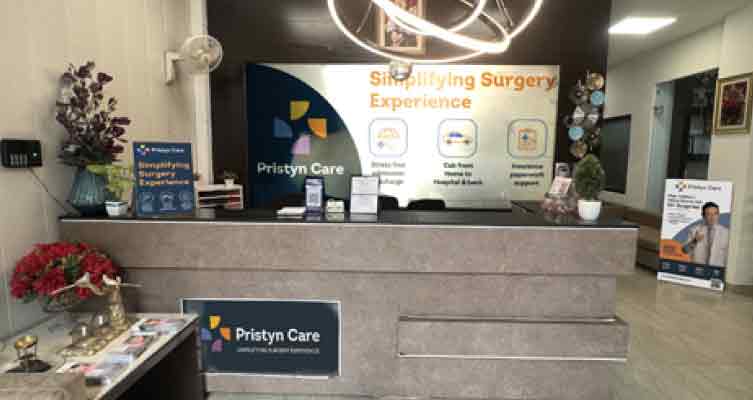
Delhi
USFDA Approved Procedures
Minimally invasive. Minimal pain*.
Insurance Paperwork Support
1 Day Procedure



Treatment of Monofocal Lens
What are Monofocal Lens
Monofocal lenses are intraocular lenses used in cataract surgery and refractive lens exchange procedures. Monofocal lenses provide clear vision at only one distance—usually either near, intermediate, or far. Patients typically choose the distance that best suits their lifestyle and visual needs prior to surgery. While monofocal lenses can significantly improve vision after cataract removal, they may still require the use of glasses for tasks requiring different focal distances.
Monofocal intraocular lenses are typically more affordable than other types of lenses, such as bifocals and trifocals. They are also easier to care for because they do not require special cleaning solutions or techniques; these lenses can be cleaned with regular soap and water.
If you are considering mono-focal lenses, talk to the best ophthalmologist in delhi at Pristyn Care about which type of lens is right for you. Generally, these are safe and effective ways to improve your vision. With the right pair of monofocal lenses, you can see clearly at all distances.
What are the Types of Monofocal Lens?
Spherical Monofocal Lens – A spherical monofocal lens is a type of intraocular lens used in cataract surgery and refractive lens exchange procedures. It corrects vision at a single focal point, typically either for distance or near vision. Unlike toric or multifocal lenses, spherical monofocal lenses do not correct astigmatism or provide multiple focal points. Patients may still require glasses for tasks with different focal distances depending on the chosen focal point of the lens.
Aspheric Monofocal Lens – Aspheric monofocal lenses are a specialized type of intraocular lens used in cataract surgery and refractive lens exchange procedures. Unlike traditional spherical lenses, aspheric lenses have a more natural shape that mimics the curvature of the eye’s surface. This design reduces spherical aberration, improving contrast sensitivity and image quality, especially in low-light conditions. Aspheric monofocal lenses can offer clearer vision at one focal distance, typically either for distance or near vision, but may still require glasses for other distances.
Toric Monofocal Lens – Toric monofocal lenses are intraocular lenses designed to correct astigmatism in addition to addressing cataracts or refractive errors. Unlike traditional spherical monofocal lenses, toric lenses have additional astigmatism correction built into their design, helping to improve overall visual acuity. While toric monofocal lenses offer clear vision at a single focal distance, typically either for distance or near vision, they are specifically tailored to correct astigmatism, reducing the need for glasses or contact lenses post-surgery for patients with astigmatism.
Get in touch with Pristyn Care to speak to the best eye surgeon in delhi for cataract removal surgery and the best monofocal lens.
How Does Monofocal Lens Help in Cataract Treatments?
Cataracts occur when the natural lens inside the eye becomes cloudy, leading to blurred or dim vision. This cloudiness typically develops gradually over time due to changes in the proteins within the lens, aging, or other factors like injury, genetics, or medical conditions such as diabetes.
During cataract suregry, the cloudy lens is surgically removed and replaced with an artificial lens called an Intraocular Lens (IOL). Monofocal lenses are a type of IOL used in cataract surgery. They have a single fixed focal point, meaning they provide clear vision at one specific distance, either for distance vision such as driving, watching TV or near vision such as reading a book or using a smartphone.
The monofocal lens is implanted into the eye to replace the cloudy natural lens. Once the lens is implanted, it helps to focus light properly onto the retina, restoring clear vision at the chosen distance. While monofocal lenses effectively treat the cloudy vision caused by cataracts, they do not correct other vision issues like presbyopia or astigmatism.
Pros and Cons of Monofocal Lens
Pros:
Monofocal lenses provide clear vision at one specific distance, either for distance or near vision, depending on the patient’s choice.
Monofocal lenses are typically less expensive than premium lenses such as multifocal or toric lenses, making them a more cost-effective option for many patients.
The performance of monofocal lenses is well-established, and the outcomes are generally predictable, with high rates of success in restoring vision after cataract surgery.
Monofocal lenses may have a lower risk of causing visual disturbances such as glare, halos, or reduced contrast sensitivity, particularly in low-light conditions, compared to other types of lenses.
Cons:
Monofocal lenses provide clear vision at only one specific distance, meaning patients may still require glasses or contact lenses for tasks requiring other focal distances, such as reading or driving at night.
Patients with monofocal lenses may still need to rely on glasses or contact lenses to correct other vision issues such as presbyopia or astigmatism.
Monofocal lenses do not restore the eye’s ability to focus on objects at different distances.
While monofocal lenses offer clear vision at either distance or near, they may not adequately address intermediate vision tasks such as computer work or viewing objects at arm’s length.
Risks and Complications of Monofocal Lens
Monofocal lenses, while generally safe and effective, carry certain risks and potential complications:
Best Monofocal Lens Brands
Global Brands:
Indian Brands:
Delivering Seamless Surgical Experience in India
Your safety is taken care of by thermal screening, social distancing, sanitized clinics and hospital rooms, sterilized surgical equipment and mandatory PPE kits during surgery.
A dedicated Care Coordinator assists you throughout the surgery journey from insurance paperwork, to free commute from home to hospital & back and admission-discharge process at the hospital.
Our surgeons spend a lot of time with you to diagnose your condition. You are assisted in all pre-surgery medical diagnostics. We offer advanced laser and laparoscopic surgical treatment. Our procedures are USFDA approved.
We offer free follow-up consultations and instructions including dietary tips as well as exercises to every patient to ensure they have a smooth recovery to their daily routines.
The choice between monofocal and multifocal lenses depends on individual preferences and visual needs. Monofocal lenses offer clear vision at one chosen distance, typically either for distance or near vision, while multifocal lenses provide multiple focal points for clear vision at various distances. While multifocal lenses reduce dependence on glasses for different distances, some patients may experience visual disturbances like glare or halos. Ultimately, the decision should be made in consultation with an ophthalmologist based on factors such as lifestyle, eye health, and desired level of spectacle independence.
The cost of monofocal lens in India may range from Rs. 28,000 to Rs. 70,000. But the cost of monofocal lens can vary due to factors such as the material used in manufacturing, the technology incorporated into the lens design, and the reputation or brand of the manufacturer. Additionally, variations in pricing may also reflect different features or enhancements offered by certain lens models, such as advanced coatings or additional astigmatism correction options.
Yes, you can watch TV with monofocal lenses. Monofocal lenses are designed to provide clear vision at a specific distance, typically chosen by the patient and surgeon before surgery. If you have chosen distance vision as your focal point, you should be able to watch TV comfortably without the need for glasses at the appropriate viewing distance.
No, not all monofocal lenses are the same. While they all function by providing clear vision at a single focal point, there can be variations in design, materials used, and additional features offered by different manufacturers. Additionally, factors such as the surgeon’s technique and the patient’s individual eye characteristics can also influence the performance and outcome of monofocal lenses.
Monofocal lenses are designed to typically last a lifetime. Once implanted during cataract surgery, they do not degrade over time or require replacement unless complications arise, such as posterior capsule opacification (PCO) or other issues that may require additional procedures. However, the longevity of vision correction provided by monofocal lenses may be affected by age-related changes in the eye or the development of other eye conditions unrelated to the lens itself.
Monofocal lenses are covered by most health insurance plans. The patients undergoing cataract surgery should discuss all the terms and conditions of the insurance coverage. The majority of health insurance policies usually cover the cost of a standard intraocular lens (IOL).
To choose the best eye surgeon in delhi, consider their qualifications, experience, and patient reviews. Look for eye doctors in delhi who are board-certified, have extensive experience in performing eye surgeries, and have a track record of successful outcomes. Additionally, reading testimonials or reviews from previous patients can provide insight into the surgeon’s skill and patient satisfaction levels.